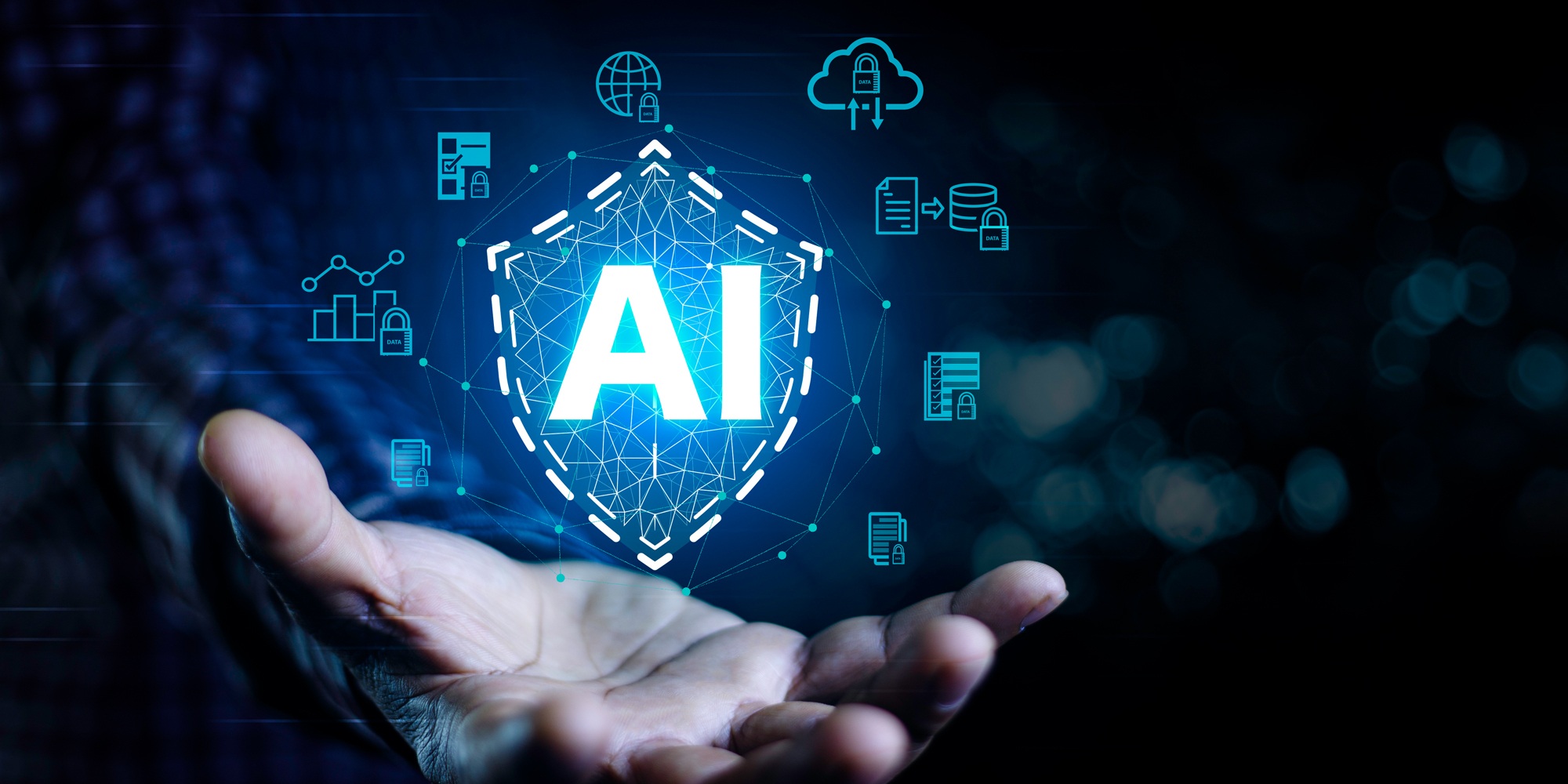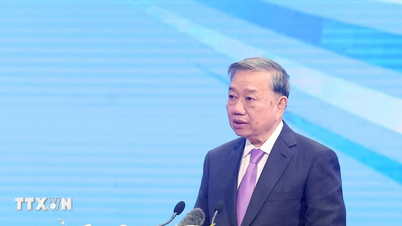In the context of sustainable development becoming a guiding principle for all businesses, ESG (Environment - Social - Governance) governance is no longer an option but has become a mandatory requirement.
But how to implement ESG effectively and transparently in the digital age?
Dan Tri newspaper reporter had an interview with Mr. Vu Thanh Thang, Director of CAIO Artificial Intelligence - Founder of SCS Cyber Security Joint Stock Company, member of the Vietnam ESG Forum Evaluation Council, to learn about the key role of this technology in solving ESG problems, as well as the opportunities and challenges that Vietnamese enterprises are facing.
1:30 p.m. on August 14, the workshop “Implementing ESG with AI, what should businesses do?” will take place at JW Marriott Hotel & Suites Saigon (HCMC). The workshop is co-organized by the Department of Science and Technology of HCMC and Dan Tri newspaper.
AI and data: The "oil" for ESG governance
How do you assess the role and potential of AI technology in supporting businesses in effective ESG management?
- I believe that AI plays a key role in helping businesses implement ESG effectively.
Nowadays, businesses are having to process a huge amount of data from many different sources such as social networks, environmental IoT systems and internal management systems.
Data is the “oil” that fuels AI to operate accurately, helping businesses operate in accordance with the ESG criteria they are pursuing.
Therefore, to effectively process this amount of data, businesses need a powerful platform that I call "AI Data Factory" or Data Platform.
This platform will collect and process data, then AI models will analyze to help businesses operate in accordance with ESG criteria. It can be said that without AI and data, businesses will face many difficulties in this transformation process.
In your opinion, what are the biggest challenges that Vietnamese businesses face when applying AI to transform ESG?
- There will certainly be challenges, because when businesses use AI in the ESG implementation process, it is almost entirely a transition to a different operating model.
And to do that, businesses need to have the right infrastructure.
In my opinion, there will be three main challenges:
Data: Business data is scattered from many different sources such as Excel, docs, PDF...; we must standardize and consolidate these data to become a single data source in the Data Platform.
Human resources: We need AI experts to help businesses transform, but this resource is currently scarce. Although Vietnamese people are very smart and suitable for the 4.0 revolution, it will take more time to have enough high-quality human resources.

Mr. Vu Thanh Thang, Director of CAIO Artificial Intelligence - Founder of SCS Cyber Security Joint Stock Company, member of the Appraisal Council of Vietnam ESG Forum (Photo: NVCC).
Legal framework and standards: National ESG standards are still incomplete, requiring businesses to experiment, like a sandbox model.
At the same time, investing in new technology is costly and may not yield immediate results, coupled with internal resistance.
Because as businesses move to new models, powered by data and AI; the workforce needs to transform and adapt to be able to operate effectively.
But there are also personnel who will react slowly and respond weaker, they will certainly resist.
What do you think about the quality of Vietnam's technology talent in bringing AI into ESG?
- With more than 20 years of experience in the field of AI and having trained many generations of technology engineers; I think Vietnamese people are very smart and capable.
Although we missed the previous three industrial revolutions, the 4.0 revolution related to data and AI is very suitable for the logical and mathematical thinking ability of Vietnamese people.
This is a golden opportunity for Vietnam to develop rapidly, if we miss this time; the country will not have any more opportunities. Because the next revolution will be quantum computing, which is directly related to high-tech infrastructure and we are losing the foundation.
The government is also making efforts to train hundreds of thousands of high-tech engineers, but it will take some time for the market to have enough human resources.
Now we can also take advantage of many AI tools to help train human resources faster, but in terms of long-term strategy, it is necessary to train systematically and through national programs on training high-tech human resources.
Regarding the environmental pillar (E) of ESG, how can AI help businesses reduce emissions and optimize energy? Can you share some practical applications?
- IoT, AI, blockchain and security are four pillars that go together. IoT will provide input data through sensors, then AI will analyze this data to adjust and optimize operations.
Meanwhile, Blockchain creates a trusted authentication platform. This technology uses smart contracts to ensure transparency and security for all data, helping stakeholders trust in a business's ESG commitments.
And Security helps protect the entire system, from IoT devices, data, to AI and blockchain platforms, ensuring information integrity and security.

IoT, AI, blockchain and security are four inseparable pillars that go together for businesses to effectively implement ESG.
Combining these technologies provides immediate and practical results.
For example, a building performance analytics system can use data from IoT and AI to optimize HVAC systems, reducing energy consumption by up to 15-20%.
This not only helps businesses reduce greenhouse gas emissions but also increases profits and demonstrates a strong commitment to their ESG goals.
For the social (S) and governance (G) pillars of ESG, what role can AI play?
- For the social pillar, AI plays an important role in listening, protecting and enhancing the capacity of workers. By analyzing big data from sources such as social networks, AI helps businesses better understand the thoughts and aspirations of employees and the community.
From there, businesses can build more suitable welfare policies and working environments.
Example in labor safety: A construction site uses AI-integrated cameras to monitor compliance with safety rules. When workers are not wearing helmets or protective gear, the system will issue instant alerts, ensuring everyone's safety and minimizing the risk of accidents.
Or in a power plant, if an incident occurs, AI will immediately provide standard handling procedures, step-by-step instructions for operating engineers. This helps to handle incidents quickly, effectively, saving time and minimizing damage.
AI can also automatically measure employee satisfaction and KPIs, helping each individual proactively adjust to better adapt to work and create the greatest value.
For the governance pillar, AI helps businesses manage risks, support decision-making and increase transparency. By processing huge amounts of data from multiple sources, AI can predict potential risks.
For example, an energy company uses AI to analyze weather and hydrological data. When AI predicts drought or floods, it will alert power plants so they can plan to adjust production or release flood water in time, avoiding major losses.
In banking, AI can detect unusual transactions, such as a large amount of money transferred in the middle of the night, and immediately alert the risk management department to check. This helps prevent fraud and protect corporate assets.
In addition, AI also synthesizes and analyzes comprehensive data, providing leaders with a complete picture of the market, competitors, and social trends. Based on this information, they can make more accurate and effective strategic decisions.

Integrating AI into governance processes also helps automate reporting in real time, instead of quarterly or yearly. This not only improves operational efficiency but also increases transparency, helping businesses build trust with investors and the community, thereby ensuring ESG commitments are implemented in a sustainable and long-term manner.
Cybersecurity: A Vital Factor in AI Applications
Regarding the issue of AI ethics and data privacy, what is your view on this issue?
- AI is a powerful tool, but like a double-edged sword, it carries both benefits and risks. Ethical and data security issues in AI are becoming a top concern for both businesses and society.
Currently in Vietnam, we still lack a clear legal framework, making it difficult to assess "unethical" behavior.
For example, an employee might accidentally use an AI tool of unknown origin to process company business data. This action could lead to an information leak, but it is difficult to determine whether it was an ethical error or just an accident.
In addition, using AI also comes with great security risks, especially when it comes to personal data. When sensitive information such as income, location, or phone number is revealed, individuals may face many troubles, even fraud.

Currently in Vietnam, we still lack a clear legal framework, making it difficult to assess "unethical" behavior.
This risk not only affects individuals but also negatively impacts the reputation of the business.
So what should businesses do to solve this, sir?
- To overcome these challenges, in my opinion, businesses need to have a proactive and comprehensive approach:
Building an internal legal framework: Based on current laws and decrees of the State (such as the Law on Cyber Security, Law on Personal Data Protection), businesses need to build a clear framework.
The framework would dictate what employees are and are not allowed to do with AI, such as only using approved AI tools and not putting sensitive company data on public platforms.
Businesses also need to organize regular training sessions to raise employee awareness of ethical and data security risks in AI.
This helps employees understand the importance of compliance, thereby minimizing the risk of unintentional behavior.
In addition, companies need to focus on protecting personal data. Disclosing customer or employee information, even accidentally, can have serious consequences.
For example, an e-commerce company needs to ensure that customer data (phone numbers, addresses) are kept strictly confidential. If this data is leaked, customers may be bothered by advertising or scam calls, losing trust in the brand.
By building a tight framework, businesses not only protect themselves from legal and reputational risks but also demonstrate responsibility to employees and customers, solidifying their position in the AI era.
According to a survey, 90% of small businesses in Vietnam do not have staff or a network security management system.
This is a big risk, because data is a business's most valuable asset. Cyberattack risks are increasingly diverse, including ransomware, targeted attacks, and especially attacks on AI models themselves.
To prepare, cybersecurity must be designed in from the start when building an ESG system. Businesses need multi-layered security, data encryption, and access authorization.
It is especially important to protect the AI model because it is the "brain" that runs the business. In addition, training high-quality human resources in cybersecurity is also essential.
As a member of the Vietnam ESG Forum's judging panel, what criteria are you interested in regarding AI application and security in the reports of businesses participating in the award?
- I would like to emphasize that AI and security are the two most important factors. AI helps businesses process huge data and monitor ESG indicators efficiently and accurately.
But to protect that achievement, cybersecurity is a decisive factor. In this year's competition, I am particularly interested in businesses strongly applying four key technologies: IoT, AI, blockchain and Security.

AI and security are two vital factors. We will evaluate how businesses build a well-structured data platform, operate transparently, and design security systems from the beginning to protect all their value.
The legal framework on AI for ESG-applying businesses in Vietnam is still incomplete. So what recommendations do you have for policymakers?
- I think policymakers should rely on existing laws such as the Cybersecurity Law and the Personal Data Protection Law as a basis for building a legal framework for ESG.
This helps businesses have a clear direction while waiting for the official law. At the same time, the Government should also have preferential policies, support businesses to apply ESG and train high-quality human resources.
Promoting data security and auditing standards is also important.
Ultimately, we need an ethical framework for AI to ensure it is used responsibly, protects data privacy and copyright, and does not cause negative social and environmental consequences.
Thank you for taking the time to chat!
Source: https://dantri.com.vn/cong-nghe/khong-co-ai-va-du-lieu-doanh-nghiep-kho-chuyen-doi-esg-20250811230525454.htm


![[Photo] National Assembly Chairman Tran Thanh Man chairs the 8th Conference of full-time National Assembly deputies](https://vphoto.vietnam.vn/thumb/1200x675/vietnam/resource/IMAGE/2025/9/29/2c21459bc38d44ffaacd679ab9a0477c)
![[Photo] Many streets in Hanoi were flooded due to the effects of storm Bualoi](https://vphoto.vietnam.vn/thumb/1200x675/vietnam/resource/IMAGE/2025/9/29/18b658aa0fa2495c927ade4bbe0096df)

![[Photo] General Secretary To Lam chairs the meeting of the Central Steering Committee on preventing and combating corruption, waste and negativity](https://vphoto.vietnam.vn/thumb/1200x675/vietnam/resource/IMAGE/2025/9/29/fb2a8712315d4213a16322588c57b975)
![[Photo] General Secretary To Lam attends the ceremony to celebrate the 80th anniversary of the post and telecommunications sector and the 66th anniversary of the science and technology sector.](https://vphoto.vietnam.vn/thumb/1200x675/vietnam/resource/IMAGE/2025/9/29/8e86b39b8fe44121a2b14a031f4cef46)
![[Photo] General Secretary To Lam receives US Ambassador to Vietnam Marc Knapper](https://vphoto.vietnam.vn/thumb/1200x675/vietnam/resource/IMAGE/2025/9/29/c8fd0761aa184da7814aee57d87c49b3)





























































































Comment (0)